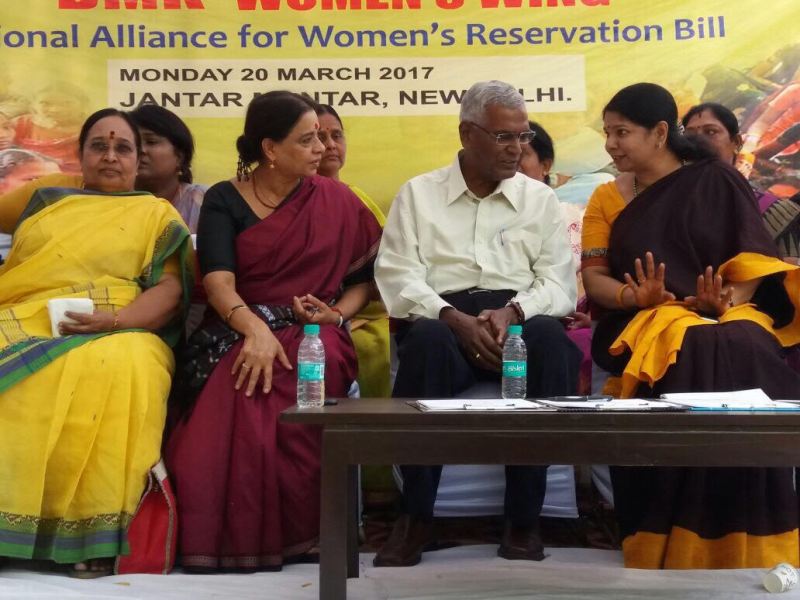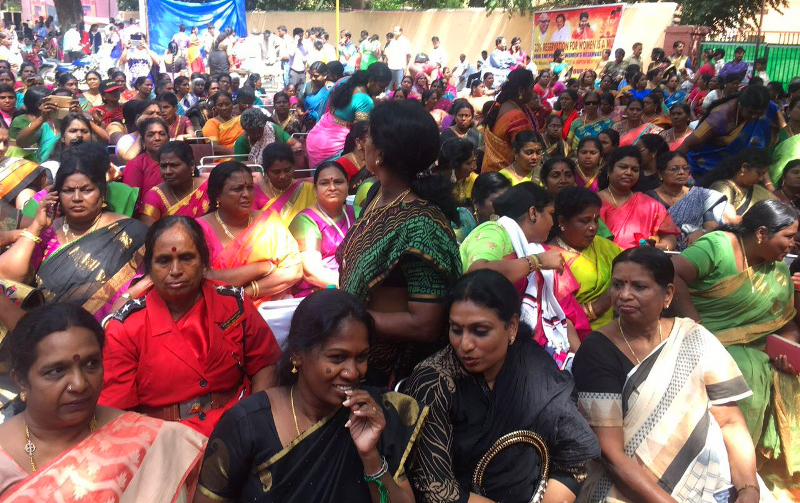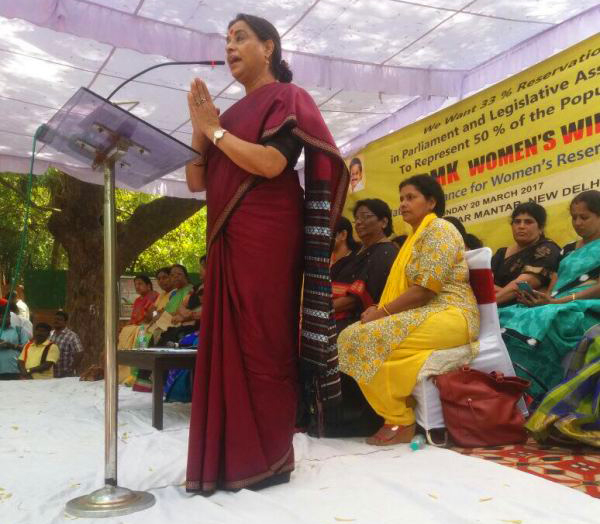On 20th March 2017, DMK organized a rally at Jantar Mantar to protest for passage of Women’s Reservation Bill. The rally was well attended by representatives from DMK, including Ms. Shankari Narayanan , DMK Women’s Wing, Ms. Helen Davidson , Former (MP), Ms. Vanthi Stalin , Former (MP), Ms. Bhavani Rajendran, Former (MP), Mr. VIjaya Dhayaban , Former (MP), Ms. Selam Sujhata (DMK Women’s Wing), Ms. Karl Marx (DMK Women’s Wing Secretary), Ms A Tamilarasi , Former (MP), Ms. Noor Jahan Begum (DMK Women’s Wing).


Additionally, it was attended by Ms. Renuka Chowdhary (MP), Ms. Supriya Sule (MP), Ms. Vandana Sive (MP), Mr. D. Raja (MP), Mr. T.K Rangarajan (MP), Ms. Rajni Patil (MP), Ms. Annie Raja (NFIW), Mr. T.K.S Elangovan (MP) and Dr. Ranjana Kumari, Director CSR. The event was well attended and more than 400 people participated in the rally.


Dr Kumari addressed the crowd and talked about how many rallies and protests have been carried out for this cause for many years. She recognized the efforts of the DMK to organize such an event, so many thousand of miles away from Tamil Nadu, and commended the large numbers of people who had turned up from all parts of Tamil Nadu, and Delhi. She traced the journey of the Women’s Reservation Bill and the importance of women in parliament and decision making positions.


To recapitulate the journey of this protest, let us take a step back in time. The history of women’s reservation began in the 1980s with the Karnataka Zilla Parishads, Taluk Panchayat Samitis, Mandal Panchayats and Nyaya Panchayats Act, 1983, reserving 25% seats for women, making it the first state to do so. At that time, many seats went vacant due to less number of candidates. In 1987, roughly three women contested for one seat when the elections were held in 1987. Orissa implemented 33% reservation much before the 73rd Constitutional Amendment. It also decided that if a sarpanch (elected or nominated) was a man, then his deputy will be a woman.
The 64th and 65th constitutional amendments that Prime Minister Rajiv Gandhi introduced in Parliament on May 15, 1989, reserved 30% seats for women. But the Bills were defeated in the Rajya Sabha. Finally, the Narasimha Rao government passed the Bill. In the 72nd and 73rd constitutional amendments introduced in September 1991 (which became the 73rd and 74th in 1992), the reservation did not go up further; it remained at 33%. In 1993, it became part of the Constitution. Thanks to the amendments, women joined politics in large numbers, changing the scope of political debate and ideas like gender-budgeting were popularised.
Bihar took a step forward in 2009 by reserving 50% seats for women in local governments. Seventeen other states followed. But attempts to introduce 33% reservation for women in Parliament have failed. In 1996, the 81st constitutional amendment Bill for 33% seats for women in Parliament was introduced in the Lok Sabha. It was reintroduced in 1998 as the 84th amendment and again in 1999. In 2003, the Bill failed to clear the House twice. Finally, in 2010 it was passed in the Rajya Sabha but as of 2016, it is still pending in the Lok Sabha.


As part of the National Alliance for Women’s Reservation Bill, along with various other organizations, Centre for Social Research has been actively pursuing the passage of the WRB in the Lok Sabha. The WRB was passed by the Upper House (Rajya Sabha) of Parliament on 9th March 2010, but for it to be converted into an act, it must be passed by the Lok Sabha and signed by the Honourable President. We recently organized a press conference regarding this issue. We also took active part in a rally for the same issue at Jantar Mantar in July 2016. It was a matter of great pride for our entire team to witness and engage in this event organized by DMK, and we certainly hope that the Bill is passed soon in the Lok Sabha.




